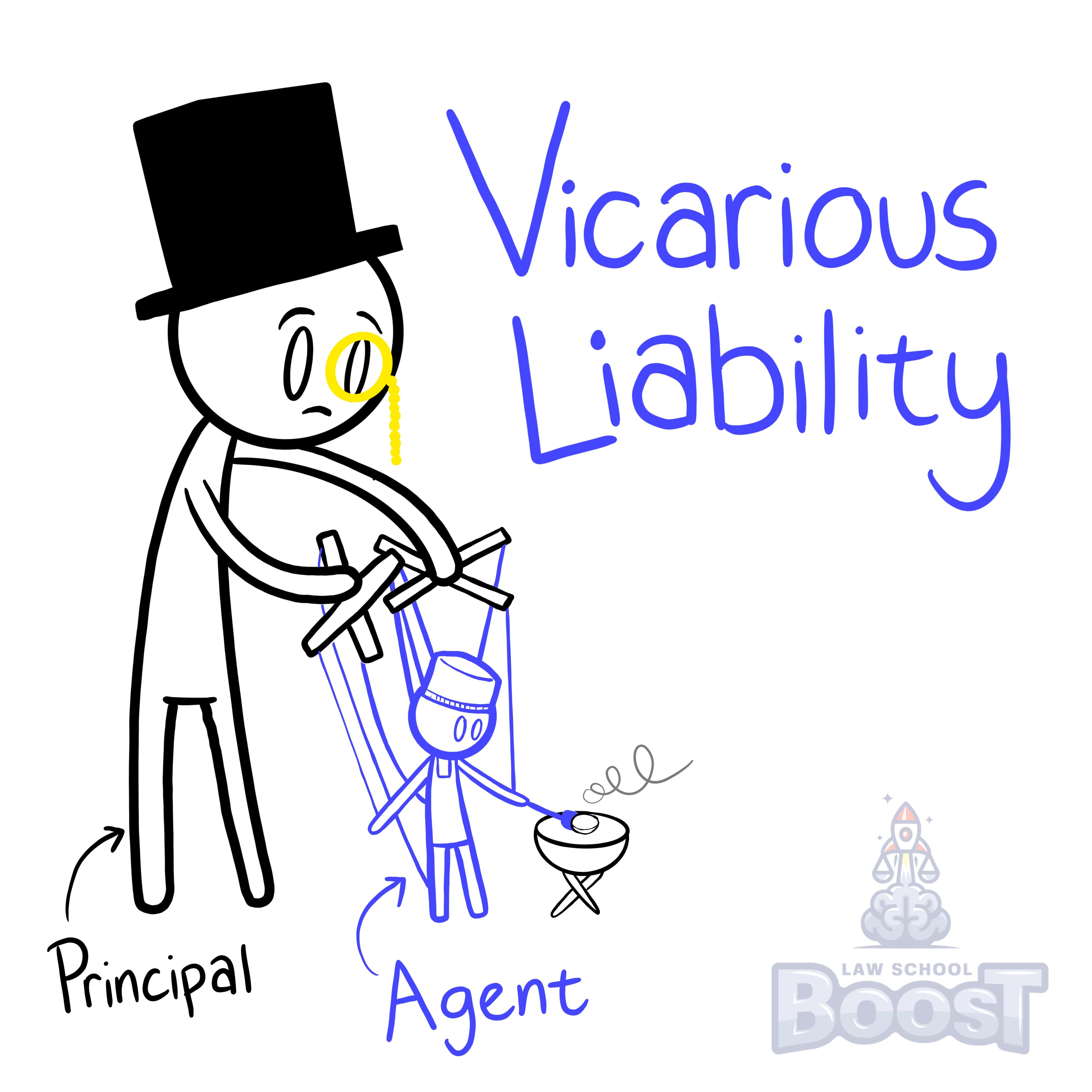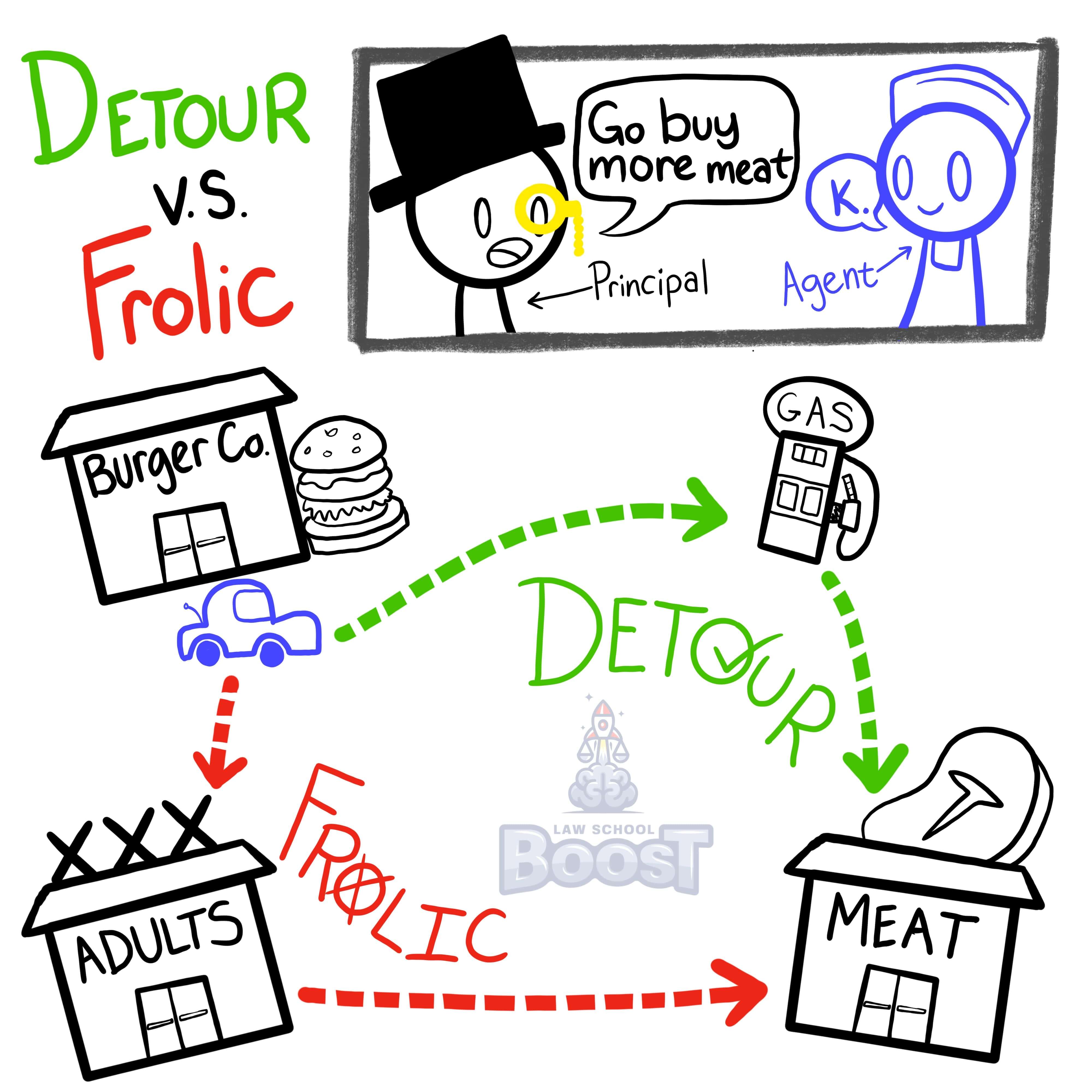👀
Torts • Vicarious Liability
TORT#111
Legal Definition
A detour is a simple departure from an assigned task, and falls within the scope of a an employee's duties. A frolic is a new and independent journey that substantially deviates from an assigned task, which means it falls outside the scope of the relationship. Employers are vicariously liable for detours, but not frolics.
Plain English Explanation
Employers (or "principals") don't always give precise instructions to their employees and, even if they do, employees do not always follow precise instructions. This creates a problem when you are trying to blame an employer for something specific that an employee does. As a compromise, the law drew a line between "detours" and "frolics."
A detour, like the name implies, happens when an employee (or agent) takes a different route or approach than the employer may have intended, but arrives at the result desired by the employer. In other words, when an employee is given a task, they complete it in a way that wasn't necessarily intended by the employer, but is pretty much the same.
However, a frolic, like the name implies, is a complete distraction that disconnects the employee from the task they were performing to the point that the employer is no longer liable.
A detour, like the name implies, happens when an employee (or agent) takes a different route or approach than the employer may have intended, but arrives at the result desired by the employer. In other words, when an employee is given a task, they complete it in a way that wasn't necessarily intended by the employer, but is pretty much the same.
However, a frolic, like the name implies, is a complete distraction that disconnects the employee from the task they were performing to the point that the employer is no longer liable.
Hypothetical
Hypo 1: Amy hires Bob at her bakery. One day, Amy realizes she is out of sugar. She tells Bob to go to the store and buy more. Bob gets in his car and, on the way to the grocery store, crashes his car into Sam. Result: Bob crashed his car while running a business-related errand for Amy, so Sam could sue Amy for his damages under respondeat superior
Hypo 2: Amy hires Bob at her bakery. One day, Amy realizes she is out of sugar. She tells Bob to go to the store and buy more. Bob gets in his car and, on the way to the grocery store, decides he wants to visit a strip club. As he's pulling into the strip club parking lot, he hits Sam's car. Result: Bob may have initially been running a business-related errand for Amy, but his personal decision to deviate from that plan and visit a strip club is a frolic, which severs the link to his employer. As a result, Sam may not sue Amy for the damage.
Hypo 3: Amy hires Bob at her bakery. One day, Amy realizes she is out of sugar. She tells Bob to go to the store and buy more. Bob gets in his car and, on the way to the grocery store, decides he needs to get gas. As Bob pulls into the gas station, he hits Sam's car. Result: Bob crashed his car while running a business-related errand for Amy. Even though he didn't go directly to the store, the brief detour to get gas does not eliminate a link to his employer. Therefore, Sam may sue Amy for his damages.
Hypo 2: Amy hires Bob at her bakery. One day, Amy realizes she is out of sugar. She tells Bob to go to the store and buy more. Bob gets in his car and, on the way to the grocery store, decides he wants to visit a strip club. As he's pulling into the strip club parking lot, he hits Sam's car. Result: Bob may have initially been running a business-related errand for Amy, but his personal decision to deviate from that plan and visit a strip club is a frolic, which severs the link to his employer. As a result, Sam may not sue Amy for the damage.
Hypo 3: Amy hires Bob at her bakery. One day, Amy realizes she is out of sugar. She tells Bob to go to the store and buy more. Bob gets in his car and, on the way to the grocery store, decides he needs to get gas. As Bob pulls into the gas station, he hits Sam's car. Result: Bob crashed his car while running a business-related errand for Amy. Even though he didn't go directly to the store, the brief detour to get gas does not eliminate a link to his employer. Therefore, Sam may sue Amy for his damages.
Visual Aids


Related Concepts
What is respondeat superior?
What is vicarious liability?
When are automobile owners vicariously liable for another's use of their vehicle?
When are employers vicariously liable for the intentional torts of their employees?
When are parents vicariously liable for the torts of their children?
When are partners or joint venturers vicariously liable for each others' torts?
When are principals vicariously liable for negligence committed by their independent contractors?
When are tavernkeepers vicariously liable for the torts of their patrons?


